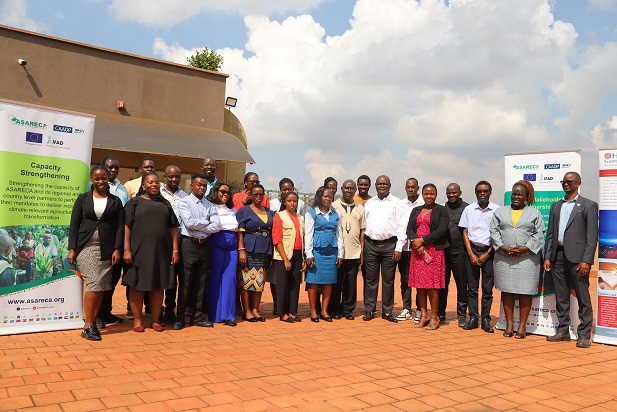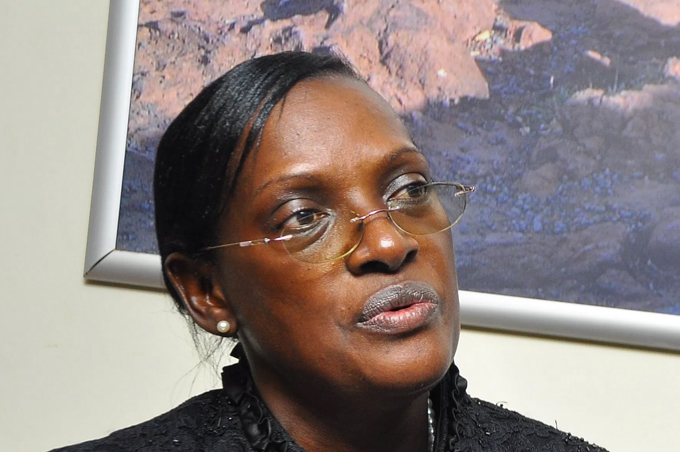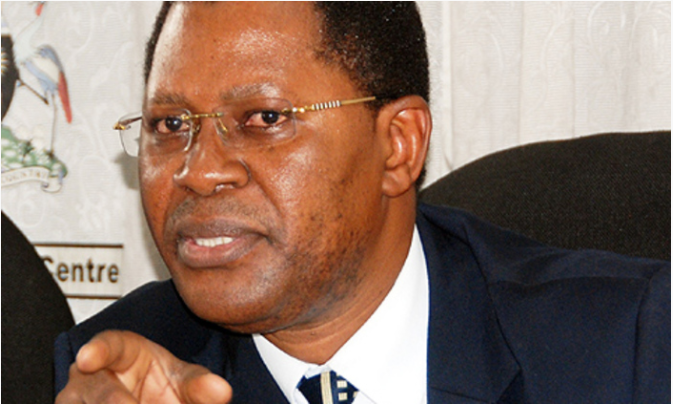Participants that are undergoing training in Integrated Pest and Disease Management Practices and Agroecology in a group photo
By Prisca Wanyenya
Scientists and experts in the agricultural sector have been urged to leave their cool offices and offer practical training to farmers on latest farming practices instead of limiting their studies to only theoretical writing if Africa is to boost agricultural production.
The call was made by Dr. Eseri Nankya, Senior Research Officer and Soil Fertility Scientist at National Agricultural Advisory Services (NARO), during the Training of Trainers in Integrated Pest and Disease Management Practices and Agroecology, organised by both European Union and the Association for Strengthening Agricultural Research in Eastern and Central Africa (ASARECA), held at Hilton Garden Inn in Kampala on Monday.
“Can we leave our desks and go to the farmers and train them practically? You have to go to the farmer and train the farmer on how to plant a tree not just publishing, can we reach out to the farmers, we need to go an extra mile,” said Nankya.
Blaise Amony, Program Officer – Capacity Development at ASARECA noted that the five day’s training of trainers is intended to enhance utilisation of nature-based practises or biological technologies among farmers, private sector, researchers, with the main target being the youths and women as these two groups, specifically women provide the biggest share of labour on farms.
“We also want to provide an opportunity for these youth and women to share hands-on experience. We are going to go and visit companies that are actually practising agroecology in Matugga, we are going to visit a company that produces organic fertilisers, organic herbicides, organic pesticides. We are trying to advocate for healthy eating. And if we want to advocate for healthy eating, we need to advocate for agroecology. We are trying to address nutrition. We want people to eat healthy food because as you have seen in the presentation, actually chemicals lead to cancer,” said Amony.
According to ASARECA, the focus on the production of organic food was necessitated by the high demand of organic foods in the European Union, which is one of the key markets for Uganda’s exports.
“There is high demand for agroecology in the European Union. They are advocating for organically grown food because, when you are exporting food in Europe, they usually want organically grown food. But also, the participants advocated for this training because you see, agroecology is a new term. People have not yet understood it properly, people confuse it with organic agriculture, regenerative agriculture, all of them are basically sustainable farming methods, but they differ in just small ways. Basically, we said, let us have this training of trainers, so that people have a common understanding and learn about the agroecological principles, the agroecological elements,” explained Amony.

The training is targeting extension workers, scientists, private sector, and agroecology experts from Uganda, Kenya, Tanzania, Ethiopia, Cameroon, Burundi, and Cameroon.
Robert Guloba, Agroecologist from Uganda noted that the training is critical as it comes at the time when the world population is increasing, yet the vital factor of production remains static, thus calling for the need to adopt sustainable agricultural practices that focuses on conserving the environment and fighting famine and starvation across the world.
He noted, “When we are using the static resource of land to grow food for the whole population is when we look at sustainability, we need to use farming systems that are sustainable and when we talk of sustainability, we are saying that we utilise this small resource of land that we have in the manner that even the future will be able to find it, when it is still in a position that to produce food.”
This call comes at the time the world’s global population has grown from 3Billion people in 1960, further increasing to 6billion people in 1999, while this population further expanded in 2012 to 7illion people, yet still, in 2024, the global population was recorded at 8billion people and projections indicate that by 2048, the world will have 9billion people.
Guloba added, “When you over use fertilizers and chemicals, you kill the land and that land once it is killed, it will take more years to regenerate and produce again. So if you have land that is already reducing, you have nowhere else to go. So the best way is, can we utilize sustainable practices to grow food, so that land is kept in production, now, and also in the future.”
During the training, Dr. Nankya emphasized the need for farmers to adopt regenerative farming practices, as opposed to the conventional farming practice that competes with nature, that ends up affecting the soil fertility and ecological system, yet these are critical factors in agricultural production.
“Do you know that when the soils are healthy, your crops are healthy? Most of the pesticides and diseases happening in our crops, this is because the soils are degraded. When we have our soils, expect a lot of pesticides and diseases and other invasive species to attack your land,” noted Dr. Nankya.
She added, “Regenerative agriculture protects the soil, there is a lot of global warming in the conventional system and there is diversity in regenerative agriculture. Regeneration is about replenishing the degraded land and restore it back to land. We have a lot of erosion because of intensive tillage and because of this, we have very little top soil and that is what we are trying to improve. We have to make sure we protect the top soil if we are to achieve regenerative agriculture.”
Although Onesimus Semalulu, from NARO welcomed the need for farmers to engage in regenerative agriculture, he however noted that this campaign is being threatened by the high intensive labour involved, for instance digging of pits, yet there are few agricultural machines to improve such practices.
“One of the challenges we are facing in promoting soil and water conservation measures is the labour involved. We have collected data and the farmers are saying yes, but the taking up is very slow, i don’t know whether we should push for some force so that soil and water conservation is made more palatable. Otherwise, yes, we know the practices clearly work and the results clearly shows they really work, but because of the labour involved, the message isn’t being easily adopted,” remarked Semalulu.
Dr. Nankya called for establishment of demonstration farms in which farmers can get practical knowledge on the various forms of regenerative agricultural practices so as to encourage farmers to adopt conservation practices.





